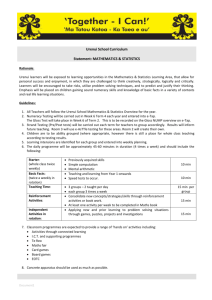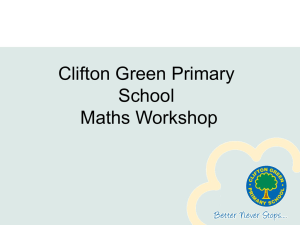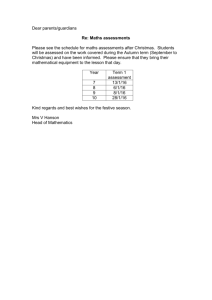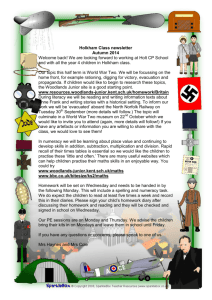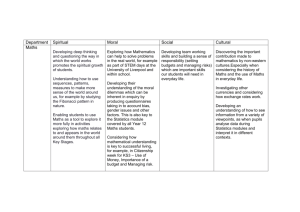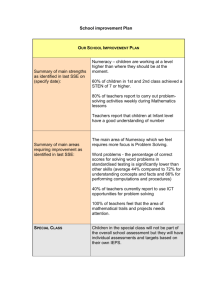Maths Policy - Roseburn Primary School
advertisement
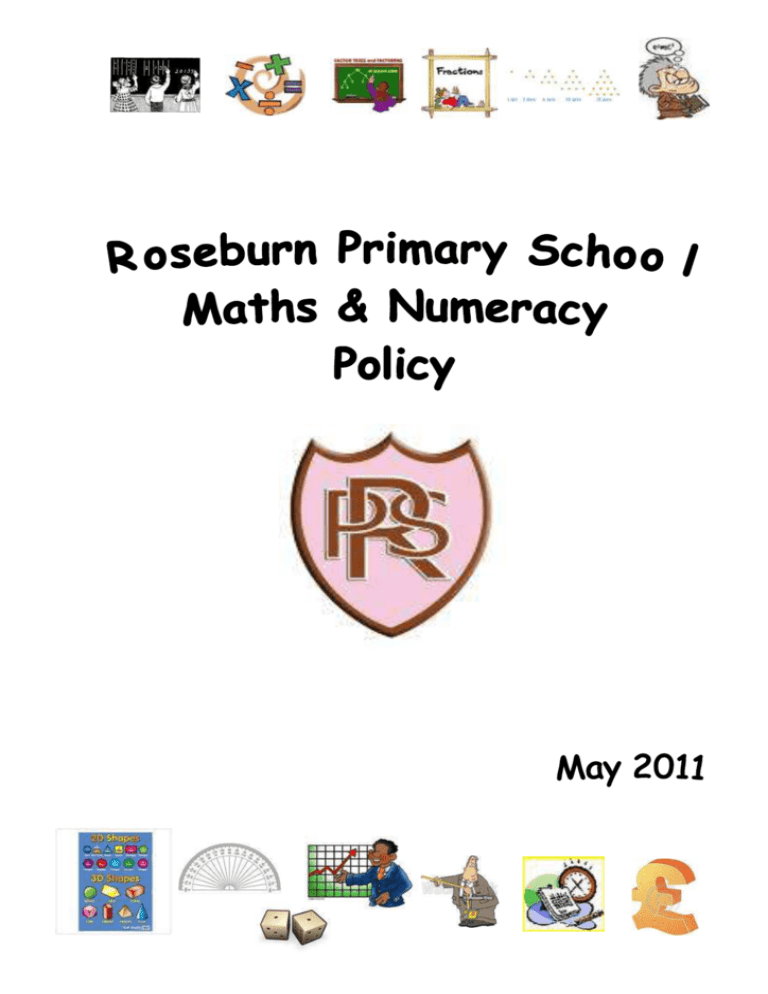
RATIONALE At Roseburn we are committed to providing our children with a progressive programme of mathematics and numeracy across learning where they will encounter a variety of challenging, active and enjoyable experiences which will develop the necessary attitudes, skills and knowledge to enable them to use mathematics in ways which are relevant to the demands of everyday life, the world of work and recreation and allow them to communicate ideas clearly using the language of mathematics. AIMS At Roseburn children will be encouraged to develop a secure understanding of the concepts, principles and processes of mathematics and apply these in different contexts, including the world of work engage with more abstract mathematical concepts and develop important new kinds of thinking understand the application of mathematics, its impact on our society past and present, and its potential for the future develop essential numeracy skills including quick recall of basic facts which will allow them to participate fully in society establish firm foundations for further specialist learning understand that successful independent living requires financial awareness, effective money management, using schedules and other related skills interpret numerical information appropriately and use it to draw conclusions, assess risk, and make reasoned evaluations and informed decisions both individually and with groups apply skills and understanding creatively and logically to solve problems, within a variety of contexts appreciate how the imaginative and effective use of technologies can enhance the development of skills and concepts. LEARNING AND TEACHING Using the experiences and outcomes from Curriculum for Excellence and the City of Edinburgh plans which can be found on GLOW programmes of study will be prepared, implemented, assessed, evaluated and reported upon and next steps identified to meet the needs of each individual child. To achieve this, teachers will use a skilful mix of approaches, including: planned active learning which provides opportunities to observe, explore, investigate, experiment, play, discuss and reflect modelling and scaffolding the development of mathematical thinking skills learning collaboratively and independently opportunities for discussion, communication and explanation of thinking developing mental agility using relevant contexts and experiences, familiar to young people making links across the curriculum to show how mathematical concepts are applied in a wide range of contexts, such as those provided by science and social studies using technology in appropriate and effective ways building on the principles of Assessment is for Learning, ensuring that young people understand the purpose and relevance of what they are learning developing problem-solving capabilities and critical thinking skills. The mathematics experiences and outcomes are structured as follows: Number, money and measure Estimation and rounding Number and number processes Multiples, factors and primes Powers and roots Fractions, decimal fractions and percentages Money Time Measurement Mathematics – its impact on the world, past, present and future Patterns and relationships Expressions and equations. Shape, position and movement Properties of 2D shapes and 3D objects Angle, symmetry and transformation. Information handling Data and analysis Ideas of chance and uncertainty. Topics where possible should be taught to the whole class and differentiated across levels. In general Early Level Nursery to P1 1st Level P2-P4 nd 2 Level P5-P7 3rd Level S1 and S2 th 4 Level S3 and S4 All topics should be covered at least twice on a three year cycle and applied to real life situations where possible. There should be 4-5 sessions of maths or numeracy in a normal week lasting 45 minutes to 1 hour. A typical lesson will include a 5-10 minute warm up where mental maths, prior learning and revision are the focus. There should be a mixture of teaching either class, group or individuals and active learning opportunities where all children are engaged and working at a pace and level appropriate to their needs. There should be a 5-10 minute plenary each session to revise learning and discuss progress in order to solve difficulties promptly and identify next steps. Homework should reinforce learning and provide opportunities for further practise, consolidation of learning or application of new skills in different contexts. It should be handed out weekly on a Monday to be completed by the Friday. This should be as active as possible and may involve games, worksheets, activities or practical tasks. RESOURCES All planners with experiences and outcomes, suggested activities and websites are available on GLOW ‘City of Edinburgh’ pages along with activities for more able learners and ideas for assessment. There is also sections for pupils and teachers. The main teaching resource is the teacher. Games and activities are located in the P1 classroom, in a maths trolley in the Resource Room and in a cupboard on the middle landing. All classrooms are equipped with Interactive Whiteboards which should be utilised for maths games and as a teaching tool. The school has a licence for ‘Education City’ log in details in each class. Other useful websites include ‘BEAM’, ‘Primary Resources’ (IR Maths/ Primary Games) Textbooks children may use in the school are Tee Jay Maths from P3/4 to P7 and Scottish Heinnemann Mathematics from P1 – P3 PLANNING A year plan should be prepared in August identifying the areas of maths to be covered each term. This will ensure balance, breadth and progression. The plan should also detail areas of maths that will be taught in context through IDL or real life situations to ensure concepts are applied and skills and attitudes for life long learning are developed. A proforma for this is on ROSE GROUP and can be adapted to suit classes. Termly plans with overviews for each topic and level overviews are available on GLOW. These should be added to plans, highlighting planned teaching opportunities and dating when completed. Plans need to be responsive and must have child input at all stages. ASSESSMENT Formative assessment is ongoing throughout each topic and takes the form of self, peer and teacher assessment. This active assessment can involve observations, questioning, explanations or the child’s ability to carry out a task. Some ideas for active assessments in context are available on GLOW. By sharing the learning outcomes and success criteria for lessons, target setting and effective feedback children understand what it is they are learning, the relevance of the task and know how they are progressing. They become involved and engaged in their own learning. Evidence of achievement should be gathered for each child in a profile showing progress towards being secure at each level. Summative assessments take the form of end of topic tests and diagnostic tests Together all these assessments inform next steps and ensure that all children are working at an appropriate level. REPORTING There is regular dialogue between the teacher and children about areas of strength, challenges, difficulties, progress and next steps. Information for parents about children’s progress in numeracy and maths is discussed at Parents’ Consultations in November and March and written reports are issued in June. Comments about significant aspects of learning are made and a statement about whether children are developing, consolidating or secure at each level. Comments should indicate breadth, challenge, depth and application of knowledge and understanding and skills. RECORD KEEPING & TRANSITION On a day to day basis significant points which affect a child’s progress in maths and numeracy or show progress, a particular breakthrough or a difficulty they encountered should be noted down, dated and kept. These notes will provide a useul point of reference when discussing progress with children, reflecting on learning and teaching, deciding on next steps or reporting to parents. Within the forward plan teachers should keep a note of maths groups and children’s levels of achievements where appropriate. Results of summative assessments should be kept beside plans. A3 versions of the success criteria should be highlighted with intended teaching for each group and dated when completed. Shocks and surprises should be noted in the space provided and these records should be passed on as part of transition paperwork. This will inform the next teacher of areas of the level still to be covered, when groups last met the outcome and who may need challenged or support. Year plans should also be completed and passed on as they provide useful information about context and maths and numeracy across learning. This allows for application of knowledge in unfamiliar contexts ROLES & RESPONSIBILITIES SMT Set high but realistic expectations for what can be achieved by children and teachers and set clear agreed targets for raising achievement Monitor the curriculum, teachers’ planning and children’s progress Provide a clear programme of study and policies to ensure consistent approaches and good progression Provide opportunities for well planned staff development opportunities Manage resources including the effective use of learning assistants Provide opportunities for effective liaison and transition Encourage parental and community involvement CLASS TEACHER Plan, prepare, implement, evaluate, assess and identify next steps in learning and teaching Differentiate the curriculum to meet the needs of all children Ensure breadth, challenge, progression and application of maths and numeracy skills across learning Create opportunities for ongoing active learning and assessment which engage all children in their learning Prepare, create and organise resources to support learning and teaching. Liaise with and plan activities to make effective use of learning assistants Discuss learning with the children and provide effective feedback on their progress Report on children’s progress to parents, partnership agencies and other professionals Encourage parental and community involvement Provide challenging relevant homework activities to support learning LEARNING ASSISTANT Implement the work planned by the class teacher with specific children Liaise with the class teacher about activities and children’s progress Discuss learning with the children and other professionals when relevant CHILD Try their best to become successful learners, actively engaged in the work of the class PARENT Support their child in maths and numeracy by providing opportunities to practise classwork and develop their knowledge and understanding and skills at home
